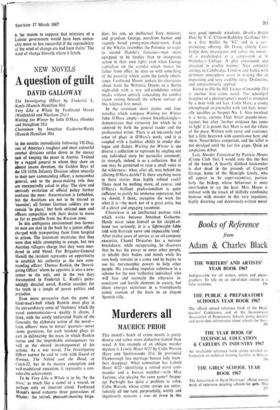The Investigating Officer by Frederick L. Keefe (Hamish Hamilton 30s)
NEW NOVELS
A question of guilt
DAVID GALLOWAY
Very Like a Whale by Ferdinand Mount (Weidenfeld and Nicolson 25s) ) Waiting for Winter by John O'Hara (Hodder and Stoughton 35s) Chameleon by Jonathan Gathorne-Hardy (Hanish Hamilton 30s)
In the months immediately following VE-Day, one of America's toughest and most colourful combat divisions settles down to the uneasy task of keeping the peace in Austria. Trained by a rugged general to whom they show an almost insane devotion, the Golden Boys of the US 115th Infantry Division adjust uneasily to their new commanding officer, a noncombat general, and to the peace-making role they are unexpectedly asked to play. The slow and unsteady evolution of official policy further confuses the men: fraternisation is forbidden, but the Austrians are not to be treated as 'enemies'; all former German soldiers are to remain 'in place,' but both enlisted _men and officers sympathise with their desire to move as far as possible from the Russian zone.
In this ambiguous environment two former ss men are shot in the back by a junior officer charged with transporting them from hospital to prison. The lieutenant maintains that they were shot while attempting to escape, but two Austrian villagers charge that they were mur- dered in cold blood. For Brigadier-General Hamill the incident represents an opportunity to establish his authority as the new com- manding officer; Thomas Rankin, the 'Investi- gating Officer' whom he appoints, is also a new- comer to the unit, and in the two days documented in Frederick L. Keefe's pains- takingly detailed novel, Rankin searches for the truth in a jungle of power politics and prejudice.
Even more persuasive than the game of blind-man's-buff which Rankin must play is the extraordinary sense of 'thickness' which the novel communicates—a quality it shares, I think, with the sorely underrated Night of the Generals; the elaborate action of the novel— from officers' mess to nurses' quarters—never seems gratuitous, for each incident plays its part in delineating the maze in which Rankin moves and the improbable consequences (as well as the absurd inconsequence) of his actions. As a war novel, The Investigating Officer cannot be said to rank with Guard of Honour, The Naked and the Dead, or Catch-22, but in its mature conception and well-modulated execution, it represents a con- siderable achievement.
To be Very Like a Whale is to be, `by the mass,' as much like a camel or a weasel, or Perhaps only an itinerant cloud. Ferdinand Mount's novel concerns three generations of Whales: the retired, pheasant-shooting briga- dier; his son, an ineffectual Tory minister; and grandson George, merchant banker and vaguely bored young-man-about-town. Each of the Whales resembles the Polonius so eager to second Hamlet's fantasies—men more equipped to be toadies than to inaugurate action in their own right; even when George capitalises on the scandal which shakes his father from office, he does so with something of the passivity which seems the family inheri- tance. Ferdinand Mount junkets his characters about from the Wiltshire Downs to a Berlin night-club with a wry self-confidence which masks without entirely concealing the sombre vision resting beneath the urbane surface of this talented first novel.
In the seventeen short stories and four novellas which compose Waiting for Winter John O'Hara amply—almost breathtakingly— demonstrates that virtuosity for which he is admired by both the general reader and the professional writer. There is an uncannily real sense of place in O'Hara's work; and it is coupled with a faultless ability to render dia- logue and dialect. Waiting for Winter is too diverse a collection to represent by singling out any individual story for particular comment; its strength, indeed, is as a collection. But if one may be permitted to raise a small voice in the wilderness: what, after all, rests behind the alluring O'Hara dazzle? Is there anything more in these stories than highly refined craft? There need be nothing more, of course, and O'Hara's brilliant professionalism is quite sufficient to justify his immense reputation, but we should, I think, recognise the work for what it is—the mark not of a great artist, but of a clever and engaging raconteur.
Chameleon is an intellectual parlour trick which works because Jonathan Gathorne- Hardy never takes himself or his sleight-of- hand too seriously; it is a lightweight fable told with first-rate verve and impeccable 'cool.' After twelve years of service as an oil-company executive, Chamil Descartes has a nervous breakdown; while recuperating, he discovers that he has the power to enter other people, to inhabit their bodies and minds while his own body remains in a coma and he begins to use his metamorphic powers to help other people. His crusading impulses culminate in a scheme for the new 'collective individual' who will fuse and reconcile the otherwise in- consistent and hostile elements in society, but chaos emerges victorious in a triumphantly comic reunion of the hosts in an elegant Spanish villa.






























 Previous page
Previous page